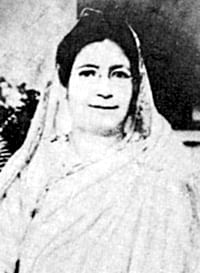Dream still unfulfilled
Dream still unfulfilled
Say top women personalities ahead of Begum Rokeya day

Although the status and condition of women has improved from the times Begum Rokeya Sakhawat lived in, most of the perturbing issues then still remain in place in the country.
The Women's movement leaders and academicians in the country made the observation yesterday at an event in the city to mark the 134th birth and 82nd death anniversary of the pioneering feminist writer, social reformer, educationist and philosopher.
"She wrote about education, family laws, conjugal relationship, voting rights, ills of religious fanaticism, child marriage, dowry and the purdah system, violence against women, discrimination – all these remain as contemporary issues," Dr Maleka Begum, professor of Central Women's University, said.
Although Begum Rokeya was born into an educated Muslim zamindar family at Pairabondh, Rangpur, she never received any institutional education. However she went on to establish the first school for Bengali women at Bhagalpur, Bihar in 1909 with money left to her by her husband, Sakhawat Hossain.
"This school was especially important for East Bengal, as most students from the Sakhawat Memorial school returned to this side of the border, filling up the void that was created after the Partition," Dr Maleka, also founder general secretary of Bangladesh Mahila Parishad (BMP), said.
She also referred to Anjuman e Khawateen e Islam (Islamic Women's Associaiton), an organisation for Muslim women of the time, through which Begum Rokeya held debates and arranged conferences about women's status and education.
Ayesha Khanom, president of BMP, said "Rokeya spoke of women as human beings in the early 1900s when even that was very challenging."
"She is one of our pioneer political philosophers," Khanom said, "she talked about the personhood of women."
She also said the principles of equality, of giving equal opportunity to women and the call to take affirmative action in this regard, which Rokeya mentioned in her writings 100 years ago, has now been incorporated in Committee on the Elimination of Discrimination against Women (Cedaw).
But society is yet to reach the Utopian dream Rokeya depicted in Sultana's Dream, her famous book written in English.
Referring to this book and 'Aborodhbashini' Prof Firdous Azim, of Naripokkho, said, "The entire issue of women in public space is still difficult in our country. The ideologies that confined women to the home are still very strong but exist in different forms."
Azim mentioned how Rokeya was against over-adornment of women, but the consumerist society these days increasingly is encouraging such practices. She said consumerism and traditional religious values are making it difficult for women to achieve the kind of status Rokeya had envisioned.
Tania Haque, chairman of department of Women and Gender Studies, Dhaka University, however, criticised policy failure in building a modern, educated, non-discriminatory society where men and women can be viewed as equals.
"Similar policies are formed for all women whether they belong to urban, rural, or indigenous communities," she said.
Citing examples of the garments sector, which employs the largest number of women, Haque said that even in case of economic emancipation of women, policy makers could not come out of stereotyping men's jobs versus women's.
Comparing the present with Begum Rokeya's time, she said, women have increased in number in the public sphere but the quality of their life has not improved that much.